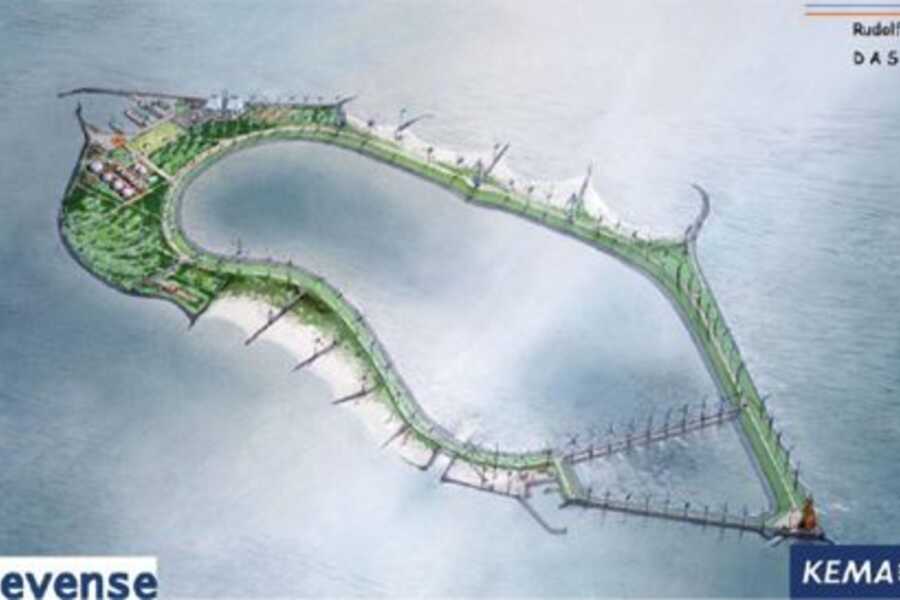A few months ago I read about Belgian plans to construct an energy island in front of their coastline. In the Netherlands, these kind of plans have been circulating already for decades, starting with Plan Lievense (Westra, 2007), which aspired the deployment of the Markermeer as an energy reservoir. Since the Dutch have been avantgarde in the field of water management for centuries, it strikes me that our beloved neighbours have outpaced us in 'our' field of expertise and even worse, they have outpaced us in ambition. Who could have seen that coming?
To be clear, I am from the nation that holds world’s oldest dike (almost 2000 year old) which can be found in Friesland. This is the nation that initiated the first official water board by Count Willem II of Holland in 1255 whereof some say, it was one of world’s first official democratic bodies. The nation that in the year 1400 started to use windmills to pump water out of ‘under sea level areas’, instead of using it for grinding wheat and grain, with the remarkable ‘Beemster Polder’ as an unchanged physical representation. The nation that created the ‘Hollandse waterlinie’, to protect against foreign invasions. The nation that reversed sea to lakes and reclaimed land where possible, resulting in 'Flevoland' which transcends the total area of New York Long Island. The nation of the famous Delta-Works and the nation that helped the Americans after Catrina to design a water protection system in the Southern states of the USA. And believe it or not, this is the same nation that is already talking for decades about the concept of energy islands in front of the coast, giving away this scoop to its neighbours.
Why is it so important, such an energy island? And what is it for god’s sake? The Netherlands strives to become more energy neutral and less depending on fossil fuels, which usually have to be imported from questionable regimes. Most commonly deployed solutions are the usage of solar and wind energy. The main problem with these two energy sources is that they are not constant. They generate a lot of energy during certain parts of the day, but less during others. Currently, there are no efficient ways of saving this energy for prolonged periods. Energy islands, are basically donut-shaped islands with a lake in the middle. During periods of high energy generation, the oversupply of energy is used to pump the water out of the lake, into the sea. During moments of undersupply of generation of energy, water from the sea floods back into the lake, passing a system of tubes and turbines and resulting in clean energy (Swah, 2013).
It is true that the profit and loss of this system is difficult to calculate, as it is highly depending on prices of fossil fuels. The lower the prices of fossil fuels, the more difficult it becomes to compete with these sources of energy and the more likely it becomes that such islands will be economically infeasible on the short term. This is usually the counterargument by criticists. In my opinion, these projects require very long-term visions however. It is fair to say, that fossil fuels will keep increasing over the long run due to a rising world population and the rise of developing countries. Furthermore, the experience Dutch firms acquire during the construction and operation cycle, can be employed in international tenders for similar projects. This can have a very positive effect to the Dutch economy. And last but not least, it can create a lot of job opportunities on the short term, adhering to the Keynesian philosophy that one should invest in large (infrastructure) projects during difficult economic times. In the Netherlands it is common to joke about the Belgians not being very bright, but it seems that they understand it better after all.
Swah (2013). "Windenergie opslaan in een kunstmatig eiland." Retrieved 01-12-2014, 2014, from http://wetenschap.infonu.nl/techniek/109442-windenergie-opslaan-in-een-kunstmatig-eiland.html.
Westra, C. (2007). "Een energie-eiland voor de kust van Nederland." Retrieved 01-12-2014, 2014, from http://www.we-at-sea.org/een-energie-eiland-voor-de-kust-van-nederland/.


